|
|
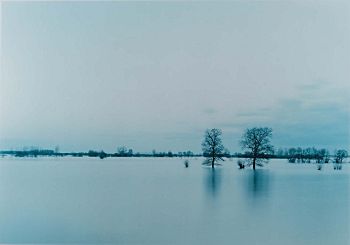
Doubt
Elger Esser
1999
_______________________
Like a belated gift,
Winter’s palpable to me:
and I’m in love with
it’s first uncertain sweep.
It’s terror’s beautiful,
like the start of what’s dreadful:
even the ravens fearful
of its leafless circle.
But most intense, fragile –
is its bulging blueness:
half-formed ice, that fills
the river, lulling, sleepless… Osip Mandelstam translated by A. S. Kline
1 2
_______________________
The dynamics of autobiography:
from anthropological anchorage to the intercultural horizons
Hans-Jürgen Lüsebrink
Translation by Linda Pontré
Mots pluriels
no 23. March 2003.
... communication, the autobiographical genre, which is basically linked to a modern concept of the individual in the West, seems to be inhabited by a three-fold evolutionary dynamic: firstly a dynamic of transformation that has resulted in connecting the structure of a linear, written, continuous narrative to the genre of the oral autobiographical narrative (which is characterized by a structure which is fundamentally dialogical, anchored in a specific communication situation); then the dynamic of a shifting of the boundaries between the private and the public, between the unsaid and the inexpressible, making of autobiography one of the privileged genres of expression of the privacy and rending of the modern individual. The emergence of autobiography in Africa shows that such shifts, which are characteristic of Western autobiography, have there given rise to reactions of rejection and resistance, and have generated hybrid forms, straddling the western model and the narratives of life inscribed in African oral traditions. Mediatization of the forms of speaking about oneself, in particular television and through the media genre of the "talk show", finally testify to a third dynamic of evolution of the genre. This links up, on the one hand, with sometimes very ancient forms of generation of personal and private narratives, in particular religious confessions, avowals and statements made before the court as well as narratives for the purposes of psychological therapy; however, on the other hand, it makes its own, in a still very unequal manner depending on the cultures and the media landscapes, the progressive abolition of the boundaries between the public and the private, between the taboo and the publicly confessable, as introduced by the scripturalization of the forms of narratives about the self in the 18th century through the genre of autobiography....(more)
_______________________
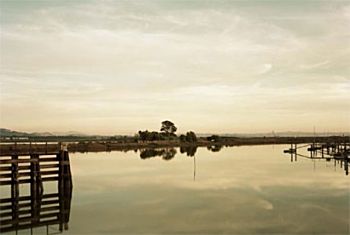
Cutting Wharf II
Elger Esser
1 2 3
Elger Esser likes to describe his photographs as “archaic locales in the middle of nowhere: seaside villages and mountain slides which hover between painting and photography.” Growing up with postcards from the 1950s, 60s and 70s, young Esser was always fascinated by how it was possible for a photographer to choose such a view which was typical of that place’s essence, and thus was worthy of being seen. Towards the end of his studies at the Academy of Fine Arts in Düsseldorf in 1996 that Esser set out on a backpacking trip through Germany, Italy, and France. En route he realized that being on the road will become the actual theme of his work; the photographs he took from then on reflect his interest in landscapes and mundane places untouched by tourists. Esser’s photographs are always very big, glossy images (app. 7ft. x 6ft.) made to resemble the view through a window. The artist takes them at dusk, when the light no longer has direction, and then brightens up the photograph in the lab. The result is a very detailed, sensuous image with a low horizon line and narrow color palette of mellow browns, olive greens and burnt yellows.
-
Middlebury College
_______________________
"To be governed is to be watched over, inspected, spied on, directed, legislated, regimented, closed in, indoctrinated, preached at, controlled, assessed, evaluated, censored, commanded; all by creatures that have neither the right, nor wisdom, nor virtue... To be governed means that at every move, operation, or transaction one is noted, registered, entered in a census, taxed, stamped, priced, assessed, patented, licensed, authorized, recommended, admonished, prevented, reformed, set right, corrected. Government means to be subjected to tribute, trained, ransomed, exploited, monopolized, extorted, pressured, mystified, robbed; all in the name of public utility & the general good. Then, at the first sign of resistance or word of complaint, one is repressed, fined, despised, vexed, pursued, hustled, beaten up, garroted, imprisoned, shot, machine-gunned, judged, sentenced, deported, sacrificed, sold, betrayed, & to cap all, ridiculed, mocked, outraged & dishonored. That is government, that is its justice & its morality!...O human personality! How can it be that you have cowered in such subjection for sixty centures?"
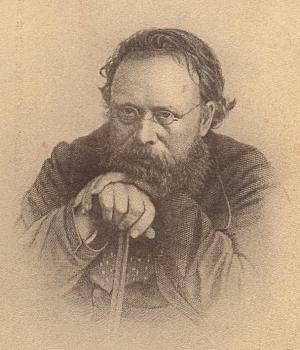
Pierre-Joseph Proudhon
15 January 1809 – 19 January 1865
General Idea of the Revolution in the Nineteenth Century
Pierre-Joseph Proudhon
tr. by Beverly Robinson's
Proudhon Archive
System of Economical Contradictions:
or,
The Philosophy of Poverty
Pierre-Joseph Proudhon
Translated from the French by Benjamin R. Tucker
What is Property?:
An Inquiry into the Principle of Right and of Government
Pierre Joseph Proudhon
tr. by Benjamin Tucker
_______________________

Patrick McGoohan
March 19, 1928 – January 13, 2009
The Prisoner
all 13 episodes
here
..........
The Prisoner - The Human Condition
Documentary about the series
48:14
_______________________
The Age
Osip Mandelstam
Translated by Marc Adler
My age, my beast, is there anyone
Who can peer into your eyes
And with his own blood fuse
Two centuries' worth of vertebrae?
The creating blood gushes
From the throat of earthly things,
And the parasite just trembles
On the threshold of new days.
While the creature still has life,
The spine must be delivered,
While with the unseen backbone
A wave distracts itself.
Again they've brought the peak of life
Like a sacrificial lamb,
Like a child's supple cartilage—
The age of infant earth.
To free the age from its confinement,
To instigate a brand new world,
The discordant, tangled days
Must be linked, as with a flute.
It's the age that rocks the swells
With humanity's despair,
And in the undergrowth a serpent breathes
The golden measure of the age.
Still the shoots will swell
And the green buds sprout
But your spinal cord is crushed,
My fantastic, wretched age!
And in lunatic beatitude
You look back, cruel and weak,
Like a beast that once was agile,
At the tracks left by your feet.
The creating blood gushes
From the throat of earthly things,
The lukewarm cartilage of oceans
Splashes like a seething fish ashore.
And from the bird net spread on high
From the humid azure stones,
Streams a flood of helpless apathy
On your single, fatal wound.

Osip Mandelstam
b. Jan. 15 1891 _______________________
Chasing Fireflies
W.D. Snodgrass
You live bits of the first Big Bang
Burning to turn each other on
As ships blink bright Morse through the murk,
Or Yin winks to rekindle Yang,
Let crusted contact points be drawn
To contact points and close the circuit.
You specks in my prospecting pan,
Flecks in Night's lapis lazuli,
Midsummer's flickering Xmas strings
Whose random constellations can
Alter all sky-signs' augury
By linking dots to outline Things,
I am the mower, Snodgrass, known
Through fields and meadows run to seed,
Undertended and overgrown
With ragweed, sneezewort and neglect
Where moths lay eggs and fireflies breed --
You are the harvest I collect.
Forgive the finger rings we children
Made from your torsos' fading brilliance;
Join in my Mason jar, my glass
That lucidates dark worlds when filled
With your good kith and kin whose millions
Might excite, once, critical mass.
I've loafed all summer at my lawn
Chirping songs bawdy and improper;
Now that my chords are halfway gone,
Leaving me like some dumb weedhopper
Whose half-cracked brain may never mend,
Let axon still sing out to dendrite.
Enter my net and neural network,
You sparks that arc old synapses;
Though I've grown stiff and gray and can't learn
New songs or finger the same fretwork,
You wouldn't leave Diogenes'
Ghost out here looking for his lantern?

W. D. Snodgrass
(1926 - 2009)
photo - Kathleen Snodgrass
_______________________
From the origin of societies, the spirit of man, confined and enveloped by the theologico-political system, shut up in a hermetically closed box, of which Government is the bottom and Religion the top, has taken the limits of this narrow horizon for the limits of a rational society. God and King, Church and State, twisted in every way, worked over to infinity, have been his Universe. For a long time he has known nothing, imagined nothing beyond. At last, the circle has been traversed; the excitement of the systems suggested by this has exhausted him; philosophy, history, political economy, have completed the triangulation of this inner world; the map of it has been drawn; and it is known that the supernatural scheme which humanity contemplates as its horizon, and its limit, is but itself; that, far as humanity may look into the depths of its consciousness, it sees but itself; that this God, source of all power, origin of all causality, of which humanity makes its sun, is a lamp in a cavern, and all these governments made in his image are but grains of sand that reflect the faint light.
These religions, these legislations, these empires, these Governments, this wisdom of State, this virtue of Pontiffs, all are but a dream and a lie, which all hang upon one another and converge toward a central point, which itself has no reality. If we want to get a more correct idea of things, we must burst this crust and get out of this inferno, in which man's reason will be lost, and he will become an idiot.
-
Pierre-Joseph Proudhon, General Idea of the Revolution in the Nineteenth Century
_______________________

Mother and child in rubble
Take a Walk Through Gaza
Youngfox Canada
Americans: These are your weapons and tax dollars at work.
Canadians: The Stephen Harper Conservatives in action.
The Canadian government was the ONLY country at the U.N. to vote against the last ceasefire agreement.
The only one.
Aren't you proud?
_______________________
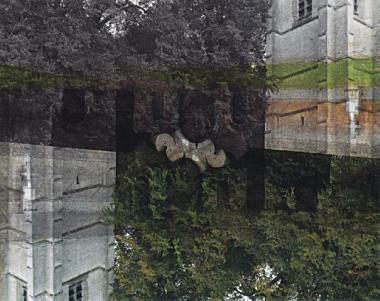
Combray
Elger Esser
_______________________
The emergence of early modern Commons
Technology, Heritage and Enlightenment
Antonio Lafuente & Nuria Valverde
Our age is rediscovering the importance of commons. Every day we see items in the press directly or indirectly claiming the status of commons for the air, water, the oceans, biodiversity, software and even science itself. And indeed many of the problems facing us are so huge or so complex that they cannot be dealt with on a national basis, but require commitment on a plurinational or even planet-wide scale. Such is the case with CO2 emissions, AIDS, or Genetically Modified Organisms.
Our subject, however, is not the society of risk but commons, that feature of consuetudinary law that has re-emerged from the past and is now claiming our attention. This is hardly surprising, for our world urgently needs to extend common property: that is, those legal entities that are available to all and belong to no one - not even the state. But let us not be hasty- for the moment, it is sufficient to state that to the old tension modernity introduced between private and public, between state and market, we must now add a third element- commons. Public administration is no guarantee of the adequate management of common property, proof of which, among many other examples, is the disastrous environmental situation in the former Soviet bloc. In any case, the questioning of public property does not necessarily imply the favoring of private property, unless we ignore the possibility of widening the public domain by means of removing some goods from state control and passing them to civil society.
The casuistry of the reasoning may be complicated, but all the cases quoted above have one thing in common, since we are talking of objects that evolve from the interaction of our environment and our technology. Obviously America existed before it was discovered by Columbus, but it is equally true that as from that year of 1492 its existence, like that of Oxygen in 1777, the hidden sources of the Nile in 1858, or the DNA molecule in 1953, acquired a status of a completely new and conclusive character. America, as well as Oxygen, the Nile and DNA became laboratory specimens, objects that could be mobilized by means of maps, formulae and tables. In other words, objects that, without detriment (either then or now) to their importance for human life (or culture), were destined to be the object of great and controversial experiments, whose solution required the cooperation of more experts and new technologies.
The same is true of Michelangelo's frescos, the manuscripts of Qumran or the bones of the child of Lake Turkana that, once appreciated by archaeologists or paleontologists, become objects bearing witness to a past that can only be studied using sophisticated technologies and specialized language. Let us now see these technologies at work....(more)
HOST journal of History of Science and Technology _______________________
Exploring the digital city: space culture politics
an AHRC funded workshop of the Geddes Institute for Urban Research, University of Dundee
_______________________
from
Nightwatchman's Song
W. D. Snodgrass
What’s obscene?—just our obsessed,
Incessant itch and interest
In things found frightful:
In bestial tortures, rape, incest;
In ripe forbidden fruit
Dangling, lush, just out of reach;
Dim cellars nailed up under each
Towering success,
The loser’s envy that will teach
A fierce vindictiveness,
The victors’ high court that insures
Pardon for winners and procures
Little that’s needed
But all we lust for. What endures?—
Exponential greed
And trash containers overflowing
With shredded memos, records showing
What, who, when, why
’Til there’s no sure way of knowing
What’s clear to every eye:
The heart’s delight in hatred, runny
As the gold drip from combs of honey;
The rectal intercourse
Of power politics and money
That slimes both goal and source.
What’s obscured?—what’s abscessed.
After inspection, I’d suggest
It’s time we got our head
Rewired. I plan to just get pissed,
Shitfaced and brain-dead.
...(more)
Tuned and Under Tension: The Recent Poetry of W.D. Snodgrass
edited by Philip Raisor google books
_______________________
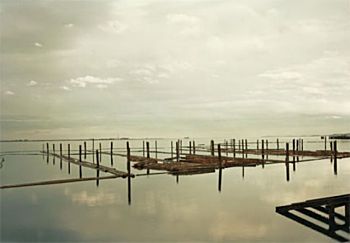
Port Angeles
Elger Esser
_______________________
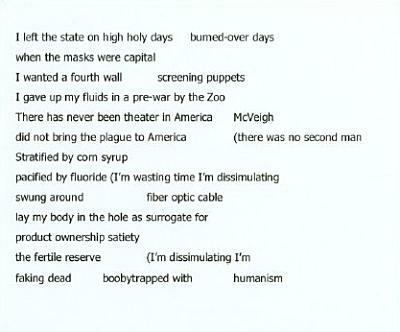
Autoimmunity
Eleni Stecopoulos
out-of-print TAXT chapbooks
via Jasper Bernes

Untitled.11
(Diaspodra)
Joshua Lutz
1 2 3
A Conversation with Joshua Lutz
Jörg Colberg
Joshua Lutz and the forgotten Meadowlands between New York and New Jersey
Lutz: Meadowlands
youtube Meadowlands
Joshua Lutz
amazon
_______________________
from
The Age of Briggs & Stratton
Peter Culley
New Star Books
pdf preview available
xix. A Letter From Hammertown
to Fort Tryon
My exoskelton
protects my tongue
but leaves my
hindquarters exposed,
if only to the weather:
my country,
created by the dry stroke
of a Whitehall pen
for the benefit of haberdashers
and fishmongers
saw the draft resisters
as a rich source
of mental pelts
for acid testing
and the carbonation
of Lake Erie,
Vancouver was the
first city
to banish Lenny Bruce
ship back the Sikhs &c.
& skim the foam
from the cappuccino triangle
so of course
we’re funny — it’s what
we have
instead of checks and balances, what
allows us
to coin in the shit
with a smile
in a dome
of bearish lavender
while pivoting
our ju-jitsu
ever inward.
Peter maintains mosses from an old manse
12 or 20 questions: with Peter Culleyrob mclennan
Peter Culley at the Electronic Poetry Center
_______________________
Same Difference
Lebbeus Woods
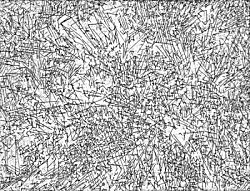 Skeptics claim that the widespread public push for personal identity is the dying gasp of individuality in the flood of consumerist conformity engulfing the world. Optimists claim that their coexistence is the first stage in the emergence of an entirely new and more complex, even more subtle, form of human society, a step up in human evolution. Skeptics claim that the widespread public push for personal identity is the dying gasp of individuality in the flood of consumerist conformity engulfing the world. Optimists claim that their coexistence is the first stage in the emergence of an entirely new and more complex, even more subtle, form of human society, a step up in human evolution.
In the realm of aesthetics—which is the flipside of ethics—it is clear that new definitions and distinctions must be made. The age of the singular and original object standing out from an aesthetically anonymous background (the Medieval model) is ending. Appropriation, the death of the author, and most especially of the genius, “mechanical reproduction”—not only in product and print, but also in virtual and electronic form—signal new aesthetic techniques, and also new aesthetic values and criteria of judgment. The emphasis is shifting to the background—the field—which is no longer anonymous and uniform, but alive with the unique, the singular, mass-produced and not. In such a time, designers, artists, and architects must rethink and redefine, in visual terms, the global field condition. They must learn to see, and enable, variations in the field—the aesthetically and socially complex field—and for that task what they most need is the capability to perceive, and conceptualize, the differences in similarities....(more)
_______________________
Liminalities
a journal of performance studies
The Invisible Theatre of Antonin Artaud
Mischa Twitchinenter
installation soundtrack - 25 minutes
Sarah Palin, Sexual Anomalies and Historical Analogues
Carrie Rentschler .....................................................
Performing vs. the Insurmountable: [pdf]
Theatrics, Activism,
and Social Movements
Benjamin Shepard, L. M. Bogad, & Stephen Duncombe
The following essay considers the pros and cons of the use of street theater and ludic antics in social movements. For many involved, play is viewed as a resource with many applications for movement activity. Yet, it is also an area requiring explanation. At its most basic level, play as political performance is about freedom—of the mind and the body—from any number of repressive forces, from the state to the super ego, the cop in the head. The meaning of play for social movement performance includes countless dimensions. On a very practical level, libratory play is recognized by many movement activists as a means to elude repression. It helps activists disarm and empower rather than engage in a street fight. It also draws audiences. In the face of duress, social movement activity is perhaps most useful in helping social actors cultivate and support communities of resistance. Here, new communities form, counterbalance and engage rather than cower in the face of often insurmountable political opponents. It is not a new phenomenon. Take the Diggers who took St. George’s Hill in 1649. While they failed to hold their autonomous zone, “what these outcasts of Cromwell’s New Model Army did hold dear was the community created in their act of resistance; it was a scale model of the universal brotherhood they demanded in the future,” Steve Duncombe writes. The authors of this essay have had similar experiences with social and cultural play and community building. To make sense of these experiences, we have employed an autoethnographic approach to writing this paper, integrating both participant observation and theoretical developments in order to cultivate an understanding of play and activist performance. .....................................................
Liminalities - Special Issue On The City
March 2008
edited by Daniel Makagon
_______________________

Stadtkulissen Berlin
Mirjam Siefert
Neunplus
Neunplus is a collective of photographers based in Berlin, Germany, which was founded in February of 2005 by students from FAS. We have a gallery and work space at Borsigstrasse 9 in Mitte, the central district of Berlin.
Since January 2006, Neunplus has been an accredited non-profit association for the promotion of independent photography and contemporary photographic art.
via Mrs. Deane
_______________________
A Conversation with Marjorie Perloff [pdf]
Hélène Aji
and Antoine Cazé
Paradigme
It’s true that I am at heart something of a formalist, in the sense of Russian Formalism. I like structure although not necessary collage structure. But, yes, collage allows one to avoid dealing with causality, something I’ve always had difficulty doing. In college, I once took a course in Ethics and wrote a paper on free will versus determinism. I got a C+—my only such grade—with the comment that I was a master of the non-sequitur! Well, I made a virtue of necessity and parataxis is a mode of avoiding logical continuity.
But it’s also the case that I am a Modernist at heart. For example, I have little in common with most Americanists because I really don’t want to study 18th and 19th Century American literature, which is too didactic, too overtly moral for my taste. I’m being partly facetious here—of course I love Melville and Dickinson and Whitman—but I have a greater affinity to European modernism, whether German, French, or Eastern European than I do to American Studies. And although I’ve written a great deal on “postmodernism,” I have come to believe that the real revolution in the arts came at the beginning of the 20th Century and that it came in Europe. The World War I period is the period I love. I think I'm a Modernist in the sense that I do believe in art as somehow transcendent and I care about its formal values and admire difficulty. Then, too, I am more at home with irony than, say, with melodrama or invective. That taste has a lot to do with Vienna- its early twentieth-century writers and artists were markedly ironists: Karl Kraus, Schnitzler, Musil, Kafka. I love Joseph Roth's Radetsky March. And that irony points the way to such later poets as Frank O'Hara, where play is so central.
via Charles Bernstein Web Log
_______________________
What are the coordinates of theory?
blah-feme
... I find myself in an ever more hostile political and epistemological environment in which the backlash against theory has not only taken up its place in those ‘post-theoretical’ rhetorics of well known well-trodden high-profile debates (Eagleton, et al) but the backlash has become absolutely generalised: to theorise, it now seems, is to leave oneself open to the distinction of mere crass generalisation.
I am, to be sure, perplexed by the wholesale academic abandonment of theory in my own discipline. But it is not localised there, of course. My discipline’s falling out of love with theory is, inevitably, a falling out of love with the idea of thought as having a kind of ‘power’ as Simon Critchley has put it. For some, the decline of philosophy into theory is the beginning of the problem, but for me that moment marked a particular fecundity in the idea that the given-ness of the world is available to radical question....(more)
_______________________
Saltgrass Journal Issue 3
"as if my name had been erased"
Kate Greenstreet
A memory of objects. Reimagined.
A completely new kind
of seeing. All gradations of light.
Trees huge at their base, like houses.
Thousands of miles.
From the roof,
the street. The windows black and lit.
Those slow connections we talked about.
via Mathias Svalina (Yes, Starlings! Yes!)
_______________________
a new issue of Common-place
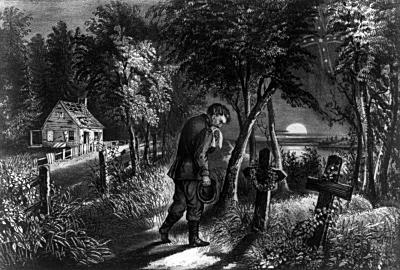
The Lost Cause
Currier and Ives
(1872)
The Mind of the North in Pictures
Currier and Ives's Civil War
Bryan F. Le Beau
Currier and Ives never intended to produce prints of great value. They sold their products for as little as fifteen cents and no more than three dollars. Rather than aspiring to have their work exhibited in the nation’s fine-art museums and galleries, they sought to have it hung on the walls of America’s homes, stores, barbershops, firehouses, barrooms, and barns.
.....................................................
The Rise and Fall of Relationship Banking
The transition from financial continuity and stability to market pricing for financial services
Edwin Perkins
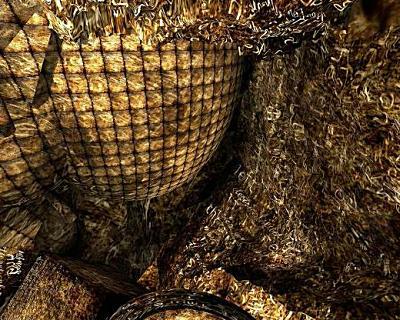
babel being born
Peter Ciccariello invisible notes
Peter Ciccariello
.....................................................
Sous Rature
ed. Cara Benson
Welcome to Aristotelian bastardization, a Derrida slum, and anon sense.
Sous Rature features work of erasure, inadequacy, and otherwise. Poems, prose, cross.
Also, images and art. This is a necessary endeavor.
2ssue online
"2ssue" includes: Bernadette Mayer, Nico Vassilakis, Brooklyn Copeland, Maria Williams-Russell, Peter Ciccariello, William Allegrezza, David-Baptiste Chirot, Rodrigo Toscano, Christophe Casamassima, James Sanders, Barry Schwabsky, Michelle Naka Pierce w/ Sue Hammond West, Alexander Jorgensen, Celina Su, Matina Stamatakis, Amy King, Bill Marsh, Brenda Hillman, Charles Bernstein, Samit Roy, Stacy Szymaszek, Paul Hoover, Sawako Nakayasu, Thomas Devaney, and Sparrow.
thanks to New Pages Blog
_______________________
Babel and Babylon
Lindsay Waters
Context
I have a confession to make. I had a major hand in the profusion of seemingly incomprehensible theory books, and I regret my part in erecting the Tower of Babel. I argue that to accept the babel of multiple and incommensurable publics is to surrender to the Babylon of an alienating governance such as the Jews fell under during their Babylonian captivity. The political activism that we rightly associate with the time period that runs from the 1930s to the 1960s was connected to the idea of the "integration" of peoples, but "integration" is a word that has all but disappeared from the vocabulary of political activism in our day.
In this time, an age of incommensurability,1 when the bond of my ethnic belonging is supposed to be the limit of my world, there really is no public to fracture into multiplicity. The ship’s been splint to splinters; it’s sinking fast. There is no public, no society, no res publica. Almost all the public hospitals that were in every town in the U.S. have been shut down and replaced by corporate health operations, and British Rail does not belong to the public but to businessmen who put the public at risk to earn their lucre.
Society as we knew it is gone, so I believe we have to be on guard against the idea of the proliferation of pseudo-publics. These are diminished publics, hardly public at all, that some thinkers have argued must be spoken about in a language of nearly inarticulate hybridity characterized by ambivalence and equivocation, the language (precisely) of Babel. In the discourse of Babel, binary oppositions proliferate to the point where no one can tell up from down, because even the most basic means of orienting one’s self in the world—like the distinction between my right hand and my left—has been deconstructed as a distinction that makes no difference. When the wicked messenger from Babel comes he shows us how a mind works that multiplies the smallest matters. The game he plays is always 52-pickup. This is why the promoters of Babylon usually love this strain of postmodernism to be as its house philosophy, because incommensurability suits neoliberalism’s notion that privatization should rule over the attempt to define any thing as a public good....(more)
_______________________
Visions of the City Magazine - Issue 2
art and ideas from the urban landscape
Old Street, London
Kevin Biderman
 The housing estates which surround the area have seemed to almost transcend the laws of physics and bend out of the way of this tidal wave of affluence, disappearing into their own reflection. The homeless continue to heroically stake their claim to Old Street, but often almost submerge themselves into the continual crusade of half dead clubbers on a come down from a forty eight hour binge....(more) The housing estates which surround the area have seemed to almost transcend the laws of physics and bend out of the way of this tidal wave of affluence, disappearing into their own reflection. The homeless continue to heroically stake their claim to Old Street, but often almost submerge themselves into the continual crusade of half dead clubbers on a come down from a forty eight hour binge....(more)
Kevin Biderman - Photography
_______________________
How the city hurts your brain
Jonah Lehrer
"The mind is a limited machine,"says Marc Berman, a psychologist at the University of Michigan and lead author of a new study that measured the cognitive deficits caused by a short urban walk. "And we're beginning to understand the different ways that a city can exceed those limitations."
.....................................................
The Metropolis and Mental Life
Georg Simmel
An inquiry into the inner meaning of specifically modern life and its products, into the soul {2} of the cultural body, so to speak, must seek to solve the equation which structures like the metropolis set up between the individual and the super-individual contents of life {3}. Such an inquiry must answer the question of how the personality accommodates itself in the adjustments to external forces. This will be my task today.
via Kieran Healy at crooked timber
_______________________
from
Antonio Gamoneda's Georgics
the first section of Antonio Gamoneda's book Libro del Frío (Book of Cold.)
translated by Alan Page
3quarksdaily
I stretch my body out over the wood cracked by tears, I smell linseed and shadows.
Ah, morphine in my heart: I sleep with open eyes before a landscape white and abandoned by words.
_______________________

Uffington White Horse
The scouring of the White Horse:
or, The long vacation ramble of a London clerk
Thomas Hughes (1859)
The Megalithic Portal and Megalith Map via the Hill figures links provided by The Little Professor
_______________________
from
Saturday
Antonio Gamoneda
Translated from the Spanish by Donald Wellman
Infection is larger than sadness; it licks tortured partitions, it penetrates the bedrooms of sweat and laudanum and later it shakes like a cold wing: it is the dampness of people who are dying.
The impure bird arrives slowly, comes to the cups full of shadow
and capillaries of ash spread over remnants of mercury and tears.
The lens reveals mendacity but its light comes from the abyss. In front of the scorched corneas hang threads of silence. Later
the disappearances depress the heart.
...(more)
_______________________
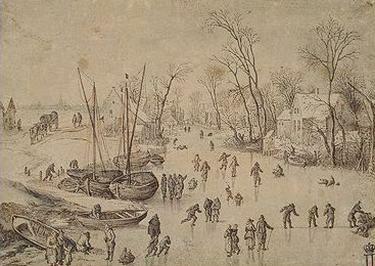
Jan Bruegel the Elder
_______________________
The Passion of Speech / 1
Marcela was visiting the snowy North. One night in Oslo, she met a woman who sang and told stories. Between songs, she would spin yarns, glancing at slips of paper like someone telling fortunes from crib notes.
This woman from Oslo had on an enormous dress dotted all over with pockets. She would pull slips of paper out of her pockets one by one, each with its story to tell, stories tried and true of people who wished to come back to life through witchcraft. And so she raised the dead and the forgotten, and from the depths of her dress sprang the odysseys and loves of the human animal who goes on living, who goes on speaking.
The Book of Embraces
Eduardo Galeano
translated by Cedric Belfrage with Mark Shafer
_______________________
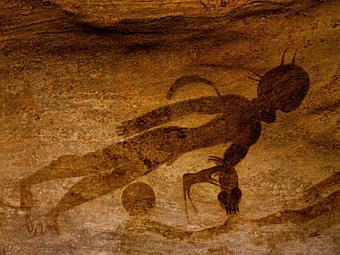
The History of Visual Communication
Elif Ayiter
I shall loosely be following P.B. Megg's book "The History of Graphic Design", which is the seminal work of this area. Given that the internet presents me with this possibility I shall be providing far more visual examples to the material covered than the book itself provides. Thus the following pages are full of clickable thumbnails which will lead you to large sized images clarifiying the subjects at hand. The in-class presentations which give plenty of additional images and information - especially where the contextualisation of subject matter is concerned, are all to be found at the "downloads" link. Additionally there will soon be a downloadable walkable 3D VRML environment that covers highlights of the course for quick recapture and also, hopefully, for fun.
I am very proud of my heritage as a graphic designer. I know that I come from a long line of remarkable individuals from the scribes of ancient Egypt and Mesopotamia to the medieval book makers, from the likes of Aldus Manutius to the constructivist El Lisitzky. They are my friends and colleagues. I look to them for instruction, for guidance, for inspiration. I know that whatever we design today rests upon their shoulders, their genius, their unfailing good judgement and taste. I look at contemporary design and see traces of gothic diminuendo or Renaisance page layout. I hope that learning the history of their craft will inspire the same pride and love in my students...
thanks to BogBlog
_______________________
 The St. Lawrence meets Lake Ontario
Kingston
photo - mw

photo - mw
_______________________
The Dreadful Mystic Banquet
Alphonso Lingis
janus head
Our old anthropocentric and predatory vision flows on in the rituals of our culture. We no longer bless our meals or lose our individualism in carnivals--our modern culture has psychopathologized individual rituals from our own feudal and theocratic past and demythologized and commercialized collective rituals. But our life is full of rituals which restage the anthropocentric and predatory vision. There are the small concentrated dramas of Everyman which are television commercials. There are spectator sports-- which are not just spectacles; they are participationist visions of transfigured vitality, glorified power and skill, a triumphant animal species. There are the daily rituals of consumption. Haute cuisine is the high mass of our global capitalist liberal civilization. Our high culture identifies as haute cuisine the cuisine that prepares the most remote and rare species for our consumption. By bringing every plant, every fish, every serpent, every bird, every mammal to the table, we put ourselves at the summit of the great chain of Being. In taking possession of jungle and tundra, the oceans and the polar icecaps, in unhesitatingly defying all the genii loci to make all substances resources for human needs and pleasures, the politico-economic institutions of humankind not only establish their sovereignty within the family of nations, but establish a cosmic sovereignty over all things. In traveling from country to country, being served like the emperor by every alien culture in restaurants where any substance, any plant or animal, is laid out for our consumption, we situate ourselves in the food chain at the top, making ourselves the uneaten ones, the unexchangeable value, the cosmic dignity. Our most terrible taboo is cannibalism. We situate ourselves ritually in nature as the species for which all other species are destined as food, but which themselves are not to be eaten. We buried our corpses out of the reach of scavenger animals, dogs and hyenas, we encased them in stone mausoleums and steel coffins, we mummified them and we inject them with formaldehyde so that they not be food of larvae, we cremate them to make them inedible even to bacteria.
What rituals will we have to contrive, to celebrate in elemental spaces, in order that the visions imparted by our ecological and evolutionary biology and our astronomy today enter into our lives? ...(more)
Contact [PDF]
Alphonso Lingis
When someone there is standing before us, we have been cautioned that he is not speaking with his own voice but speaking the language of his gender, his family, his class, his education, his culture, his economic and political interests, his unconscious drives, indeed his state of physical health and alertness. Are we then doing no more than interpreting what he says and does? Do we ever make contact with what he means for himself when he says “I”—with his visions, the story he tells himself of his life?
Philosophical PracticeJanus Head Winter 2005 | 8.2
_______________________
 Contrary to the General Interest
The Disasters of War
Goya
_______________________
Ethics in the globalized war
Alphonso Lingis
Ethics and art collude to show us what we do with our lives and with our deaths, and what we do with the lives and deaths of others. Ethics enlists the rhetoric of verbal, visual, and mimetic art, deriving its concepts and arguments from art that publicly exhibits human behaviour and possibilities. From the earliest times, war has been a prime subject of art – depicted in epics such as the Mahabharata, the Iliad, the Bible, and in monuments such as Angkor Wat, Chichen Itza, and the Church of Santiago de Capostrano. This art depicted the ruler as sublime in himself, absorbing into his destiny the lives of nameless multitudes.(....)
Francisco de Goya's set of eighty etchings, "The Disasters of War", completed in 1808 but not published until 1863, is the first great work of contemporary art. These etchings, which depict the Napoleonic armies' invasion of Spain, portray up-close men who are cornered, disarmed, castrated, and dismembered; the butchering of the infirm and aged unable to fight or flee; the mutilation and slaughter of children. The great causes of the war – the Napoleonic armies, heralding the Enlightenment, advancing into the darkness and superstition of rural Spain; the resistance of the indigenous people and their loyalties, traditions, and values – are invisible. Soldiers, peasants, women, children tear at one another like so many rabid dogs; mutilated corpses covered with flies are picked at by vultures under dark skies; scenes in which there is no God to witness, pity, and redeem so much agony, so many deaths....(more)
Dangerous Emotions
Alphonso Lingis google books
Phenomenological Explanations
Alphonso Lingis
google books
The Community of Those who Have Nothing in Common
Alphonso Lingis
google books
.....................................................
Bodies in Transit: The Plastic Subject of Alphonso Lingis [PDF]
Tom Sparrow Alphonso Lingis on the Imperatives in Things [PDF]
Graham Harman
Object-Oriented Philosophy
articles by Graham Harman
Speculative Heresy
Graham Harman has been kind enough to provide us with 13 (!) unpublished articles of his, dating from as early as 1997. These documents shed a lot of light on the emergence of speculative realism and Graham’s own particular variant in ‘object-oriented philosophy’, and come highly recommended. The topics range from Whitehead to Lingis to Latour to Heidegger to aesthetics and nature...
via larval subjects
_______________________

The Death-Beds
Goya
_______________________
Senseless Resistances: Feeling the Friction in Fiction
Eric Dean Rasmussen introduces the fictions present thread at ebr
In his polemical "Critifictional Reflections on the Pathetic Condition of the Novel in Our Time," Raymond Federman calls for writing that "resists" being "recuperated" into an easily consumed commodity. Federman's polemical piece has appeared in multiple iterations. The most recent version, to the best of my knowledge, is collected in the Fiction's Present print volume.note1note Such resistant writing will act as an "antidote" to the mind-numbing, world-supplanting images to which we, consumers in a market-driven, visually dominated culture, have become addicted:
The kind of literature we need now is the kind that will systematically erode and dissipate the setting of the Spectacle, frustrate the expectation of its positive beginning, middle, and end, and cheap resolution. This kind of writing will be at the same time frugal and denuded, but rhetorically complex, so that it can seize the world in a new way. This kind of writing must create a space of resistance to the alienated devotion to images - to the refining and undermining of the world by images. This kind of writing should be like an ironic free tense within the opacity of the Spectacle . The Spectacle, a term appropriated from situationist Guy Debord's The Society of the Spectacle, refers to the reification of social relations in a capitalist world-system that manufactures consent via seductive, fetishized, mass-mediated images.
The twelve essays in this ebr gathering suggest what is required now, in fiction's present, to conceptualize literature as a "space of resistance." Like other thinking archived at ebr, this gathering on resistances suggests how literature can play a transformative role in the emergent network society, where the printed book's technological status and social authority are rapidly shifting from dominant to residual....(more)
_______________________
FlashPøint
Winter 2008, Extra Issue 11
“Oh, no! Ezra Pound, crackpot economist, traitor, poet, nut case and anti-Semite held monetary principles more sound than those emanating from Wall Street, Harvard, Wharton, and the University of Chicago combined!? Not only that but the old lunatic, by way of Confucius and Dante, understood human nature better than the legions of free market stooges that infest our political, economic, and educational institutions and the media. Pound simply understood, as opposed to everyone with a 401K, that the world of finance attracts more greedy thieves than a pile of moose dung attracts flies in June.”
This FlashPøint EXTRA! is devoted to Topic #1: the collapsing financial system of the U.S. economy. Old Ez prophesied it 70 years ago. More to the point, he prophesied in poetry; even more to the point, denounced any contemporary poetry or art that failed to address economics and its various impacts on civilization.
.....................................................
from
Without Usura . . .
Carlo Parcelli
By usura Wall Street, American Express and Citicorp,
The Dow, The Federal Reserve and two World Wars.
By usura Korea, Vietnam, Afghanistan and Iraq;
McNamara, Kissinger, Johnson and Nixon;
Morgan Stanley, Washington Mutual, Wachovia by usura;
9/11 by usura.
By usura the Savings and Loan scandal, the Tech Stock Bubble, the Mortgage Crisis.
Miami, Washington, New York and Chicago by usura.
With usura futures are bundled like ghost wheat,
Grain rots in the servers
In the digital silos of Dubai, London and Hong Kong.
Without usura the present is not splintered into futures.
Without usura hath no country a need of a standing army of three million
Nor billions of Simons rubber necking the train wreck only
To be crushed on the weal to Calvary.
Without usura nature need not put on its game theoretical face
To show mathematical proof by crushing
The world back to uninhabitable composure.
With usura Katrina, floods, drought, fire and pestilence.
With usura the revelers and their Revelation.
With usura the filth of existence outstrips language.
Usura rusteth chassis,
It hurls 3 million into the gutter.
It gnaweth at the caissons and cables
Contemptuous of Big Muddy.
Machines learneth to stunt Nature into patterns;
Usura slayeth the child in the streets;
Usura slayeth the child in her bed;
Usura slayeth the child in the field;
Usura slayeth the child in her school.
It stayeth the young man’s courting
Bringing a gelding to bed;
It lyeth between the young bride and the amputee
CONTRA NATURAM
They have bought whores for the World Bank Conference.
Corpses are set to banking
At the behest of usura.
...(more)
_______________________

Willows at Bedford
1882
S. Fisher Corlies
234 Selected Images
George Eastman House
_______________________
The Future of the Archive / The Archive of the Future
Invisible Culture
An Electronic Journal for Visual Culture
Introduction
Aubrey Anable, Aviva Dove-Viebahn and April Miller
How, then, do past archival futures speak to present archival futures, and vice versa? Do future manifestations of the archive inevitably negate those traits we have come to associate with archives in the past or present? Does the digitization of the archive give us an opportunity to rethink the archival project in terms of how the archive, its access and selection, affects knowledge, authority, and subjectivities? More urgently, what can we learn from and what are the cultural stakes of our present investment in imagining future archives? The essays in this issue of Invisible Culture consider the question of archival futures from diverse perspectives: as scholars, as artists, as archival investigators, as interventionist researchers, and as curious explorers.
_______________________

Spring house & woods
S. Fisher Corlies
ca. 1879-1885
_______________________
p.s. on new written genres
Graham Harman
McLuhan is famous for saying “the medium is the message,” and count me among those who worship at the McLuhan altar. He was a giant of the last century, and will stand the test of time better than many imagine.
One easy way of interpreting “the medium is the message” is that it means the same thing as Whitehead means when he says that an explicit verbal statement is never an adequate expression of a proposition....(more)
Object-Oriented Philosophya new blog by Graham Harman
_______________________
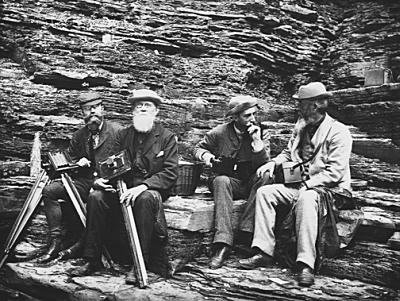
Four photographers
Enfield Glen
S. Fisher Corlies
1885
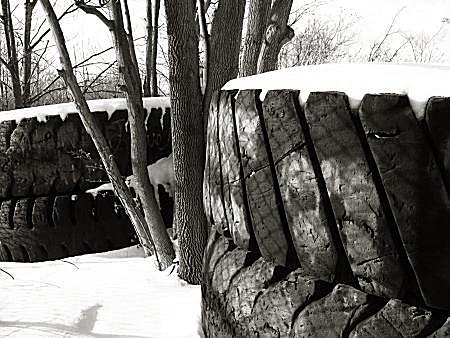
photo - mw
_______________________
Twilight of the color photo
As printed snapshots vanish, we're losing more than shoe boxes full of mementos
Dushko Petrovich
In the years since (Albert) Kahn sent his crews out with thousands of pounds of coated glass, the color print has evolved from an expensive novelty into an affordable, nearly ubiquitous object. What used to take specialists many painstaking hours can now be done by machine in a matter of seconds; 30 cents now buys an accurate, glossy color the likes of which the wealthy Kahn could only have dreamed of. As an object, the color print has finally been perfected. And yet, the 100th anniversary of Kahn's project isn't so much a triumphant moment as an elegiac one. Like the shepherds, the color print has nearly vanished. Today, you get some glossies sent out as holiday cards, and some lucky ones get matted and framed, but the vast majority of color photographs now taken - and there are countless millions of them - pass before us, just briefly, on a screen.
Our rituals have already shifted. We no longer hand vacation photos around patiently at dinner parties. If we do reach for our photo albums, the collections start to thin out around 2006. Family pictures migrated from our desktop to our "desktop," and showing off a wallet photo is suddenly very rare. Instead, we flip open to the snap on our cellphones, where our beloved's low-res face competes brightly with the time, date, and number of bars. (Many of our friends are smiling away inside that camera phone.)
Printing is still just as easy and cheap as it ever was, but given the option, we now prefer to save - or upload - instead. That tells us something about our appetite for convenience, but even more about what we want from photographs in the first place. The object itself, no matter how crisp and permanent, how lush or mysterious, turns out to matter less than our ability to capture, store, and share an image. Without the print, photography's magical power - to freeze a moment in time - is still ours. In fact, although we continue to think of the photograph as a physical thing, we are finding out that it better serves our needs without being printed....(more)via Conscientious
_______________________

at the Museum of Anthropology
365 Sketches by Adam Harrison Adam Harrison at Monte Clark Gallery
Adam Harrison is editor of Doppelganger magazine
Thirteen Paragraphs and A Footnote
on Adam Harrison's 365 Sketches
by Christopher Brayshaw
Photography's inherent technical inability to deploy what Galassi calls the synthetic option of perspective (seen, for example, in the work of painters like Uccello or Piero, in whose images the "visual pyramid" comprising the point of view and a delimiting frame is first established, creating a "static neutral container" in which to organize the remaining elements of a picture) led photography inexorably toward the "analytical option" of perspective, in which "the world is accepted first as an uninterrupted field of potential pictures. From his chosen point of view, the artist scans this field with the pyramid of vision, framing his picture by choosing where and when to stop." The important difference between the synthetic option's deployment in photography and painting is, of course, that the sketch paintings of artists like Manet, Corot, or Degas were conceived of, quoting Galassi, "through long experiment and only gradually acquired a dominant role. In photography, the camera's inability to compose rendered the old standards nearly obsolete from the outset." Galassi does not pretend to investigate the kinds of depiction that are photography's proper business, perhaps believing that this task is better left to photographers. Harrison's sketch photographs take up this project, systematically using photography to interrogate the medium's own representational legitimacy, a task I conceive of, based on my reading of writers like Clement Greenberg, Thierry de Duve, and Jeff Wall, as fundamental to artistic modernism....(more)
via Peter Culley
_______________________
poetics of value/value of poetics
jane dark'
— Meaning flows backward from the period so the century ends before it begins.
- Lacan
Lacan's remarkable observation that "the sentence completes its signification only with its last term" and thus that realization flows backward from the period — the point de capiton — is most significant to poetry, exactly because poetry proffers the false period of the line break, with its incomplete completion of the phrase. ...(more)
_______________________
LibWorld - library blogs worldwide
by Christian Hauschke, Nadine Ullmann, Sarah Lohre
lulu
On April, 23rd 2007 a series of postings started on Infobib.de, where guest authors from all over the world introduced the library and library related blogs of their own country. This book is a collection of 30 revised LibWorld articles, accompanied by a foreword by Walt Crawford. Included are articles about the blogosphere of: Argentina, Australia, Austria, Belarus, Belgium, Brazil, Canada, Denmark, Finland, France, Greece, Hungary, Iran, Italy, Japan, Latvia, Malawi, Netherlands, New Zealand, Norway, Peru, Puerto Rico, Russia, Singapore, Spain, Sweden, Switzerland, Trinidad & Tobago, USA.
Free pdf downloadvia Jessamyn West
_______________________

Pelagos
Barbara Hepworth
b. Jan. 10, 1903
_______________________
"There is a hole in the universe.
It is not like a hole in a wall where a mouse slips through, solid and crisp and leading from somewhere to someplace. It is rather like a hole in the heart, an amorphous and edgeless void. It is a heartfelt absence, a blank space where something is missing, a large and obvious blind spot in our understanding of the universe.
That missing something, strange to say, is a grasp of nothing itself. Understanding nothing matters, because nothing is the all-important background upon which everything else happens."
-
K. C. Cole, The Hole in the Universe: How Scientists Peered over the Edge of Emptiness and Found Everything
The Hole in the Universe
K. C. Cole
google books
_______________________
To The Stone-Cutters
Robinson Jeffers
January 10, 1887 – January 20, 1962
Stone-cutters fighting time with marble, you foredefeated
Challengers of oblivion
Eat cynical earnings, knowing rock splits, records fall down,
The square-limbed Roman letters
Scale in the thaws, wear in the rain. The poet as well
Builds his monument mockingly;
For man will be blotted out, the blithe earth die, the brave sun
Die blind and blacken to the heart:
Yet stones have stood for a thousand years, and pained thoughts found
The honey of peace in old poems.
_______________________

Copán idol
Frederick Catherwood
1844
found here
_______________________
There is a large mask on a stairway in the East Court, a wide-eyed human face with symbols beside it that show it to mean the planet Venus. It is something to say of Venus, and what else should we say? But without the label, we should never have found it out. The Mayan culture and this whole site as exemplar are mask and metaphor. So are we.
One of the strongest impressions that we have is that under the mask and metaphor something is there though it is not perhaps man that is there. There is something which is. Nothing else matters. Copan is a liberation. It is all gone, emptied away. To see it is to see ourselves gone, to see us freed from the weight of our own world and its limitations. One aspect of the roles we assume is taken as something more than whimsical self-indulgence. It is the assumption of the responsibility for our own natures and environment. It is to say that both can be bettered and that we know the direction of betterment and can work that way, and that given time enough and good will and energy, we can evolve a world subject to our reason and wisdom which are sufficient for that, and that this then will be the world, the world that is. One supposes that whoever may have lived at Copan may have thought this way and that the development of this city may have been directed toward that end; one supposes that whoever may have lived here is we. That the idea is historically absurd is only in part our own absurdity: it is the absurdity of our historicity. Whatever we are, we are not historical. The world we make and ourselves, so far as we make ourselves, ourselves in the particularities of time and place, as cultural man -- all this can be destroyed and make no matter. We are happy at Copan to witness our own destruction and how we survive it. If something may be said to happen, what happens to us is not what happens. The evident destruction of Copan is witness to this as we, in our own lives, are witness to the same things. We are delivered from our continuous failures and frustrations. Perhaps more importantly, we are delivered from our self-limited successes, the awful banalities of the good life.
Joy and desire surround us without our doing, without our understanding.
The world or what we term the world, that medium in which we find ourselves, and indeed whatever of it we set apart and term selves, is not related to what we make of it and not dependent on what we make of the world or make of ourselves. It is not in the least altered, nor is our basic nature altered, by any cosmology or culture or individual character we may devise, or by the failure or destruction of any of these, as all of them fail. If they seem for a time to succeed, they blind us as though they were real; and it is by our most drastic failures that we may perhaps catch glimpses of something real, of something which is. It merits our whole mind. The good society and the good life are more than we could imagine. To devise them or to assert and defend their devising is not the point.
-
part of a longer quote from "Copan: Historicity Gone" by William Bronk provided by Ray Davis
.....................................................
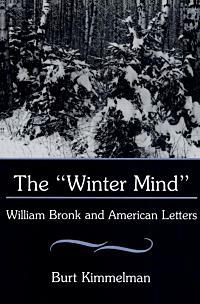
The "winter Mind": William Bronk and American Letters
Burt Kimmelman
google books
_______________________
'Israel's behaviour makes me ashamed of being a Jew, and Canada's servile support of the United States' position that it is all Hamas's fault makes me ashamed of being a Canadian'
- Anton Kuerti
_______________________
And Who Is Crying
Alice Notley
Fence v.5 n.2
... the humane treatment of prisoners is a treaty stipulation and not a moral obligation. the United States has always done as it has wished, says Cherokee, with regard to treaties. ask any Cherokee. because it is not important to get along with anyone except for the powerful and rich. as none of us have ever counted. every single person mentioned on the front page of the international herald tribune today is a man except for the bits of the blownup Palestinian woman the first terrorist of her kind. every column on the op ed page is by a man. there are photos of a male tennis player and of the male premier of Bavaria, there is a photo of an Israeli woman weeping, because the tears of women are politically exploitable. ( and why am i crying?) inside the newspaper are three photos of soldiers including one of a general, a photo of many male Afghans, a photo of a male journalist who has disappeared, the Palestinian leader Yasser Arafat posing with two young boys, a photo of four Macedonian men in their village, a photo of some men involved in the Enron scandal, a photo of a man head of the SEC, a photo of a wireless computer screen in Tokyo with a Japanese worker, a man, nearby, a photo of a man who works for Apple, a photo of men from a Rugby match, another photo of the male tennis player, a photo of two football players after a match.
i am not dead but will die in this world and my death is my soul, who is crying. as none of us has ever counted. do you know what your existence was—that is a discredited kind of question. if everything i know is from my body. where i am and my soul is. was i alive only to be aware of that fact. was i alive only to love and be hurt by that. was i alive to be told over and over by people, not just men, that i Òhad so much going for me.Ó was i alive to give the men a justification for their obscene machinations pervasive throughout the details of my own life even into my body and causing the crying of my soul. so you might say this is to go too far, but it is not. we have all been invaded, we the dead women, and that is why we are together in negative space.
about 450 U.S. troops have already arrived in the Philippines, Pentagon officials said. Alma is an owl and she will terrorize you in your future dreams when you wake up knocking your head against the headboard of your bed, trying to get out of your past actions, for i know things about soldiers, but no one would ever listen. because your body in its privacy in its veritable intimacy of you—and why am i crying?—knows it has no right to kill, except for food, and even that is sticky. but all of this is discredited. Alma is your omen, god is your omen, beware of her. if you see her you will know, that before your death the privacy of your body will be filled with the wings of your guilt; for you will know that anyone's self is as intimate to that one as yours is to you and you negated that, you deleted yourself. the death was yours and it was the worst thing you could do. you will know this from exactly within where god's wings have come....(more)
_______________________
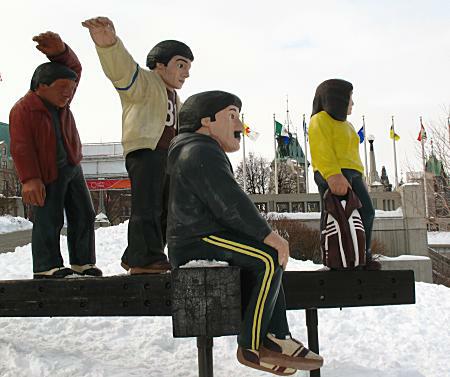
balancing
John Hooper
1981
photo - mw
_______________________
Intellectuals
Robinson Jeffers
It is so hard for men to stand by themselves,
They must hang on Marx or Christ, or mere Progress?
Clearly it is hard. But these ought to be leaders...
Sheep leading sheep, "The fold, the fold.
Night comes, and the wolves of doubt." Clearly it is hard.
Yourself, if you had not encountered and loved
Our unkindly all but inhuman God
Who is very beautiful and too secure to want worshippers,
And includes indeed the sheep with the wolves,
You too might have been looking about for a church.
He includes the flaming stars and pitiable flesh,
And what we call things and what we call nothing.
He is very beautiful. But when these lonely have traveled
Through long thoughts to redeeming despair,
They are tired and cover their eyes; they flock into fold.
Jeffers at PoemHunter
The Selected Poetry of Robinson Jeffers
The Collected Poetry of Robinson Jeffers
Robinson Jeffers
google books
_______________________
Inger Christensen - 1935-2009
Eiríkur Örn
via NewPages Blog
_______________________
An Interview with Clayton Eshleman
Jessa Crispin
_______________________
Art and Human Sacrifice
Therese Doucet
The Adirondack Review
_______________________

The Fence
circa 1935
Eudora Welty
Portraits Taken by the Writer as a Young Woman (in Hard Times)
Karen Rosenberg reviews "Eudora Welty in New York: Photographs of the Early 1930s" at the Museum of the City of New York
_______________________
Miscelánea
A Journal of English and American Studies
University of Zaragoza
fifteen issues online
_______________________
Americana
E-Journal of American Studies in Hungary
_______________________
Hannah Arendt on Walter Benjamin
Insofar as the past has been transmitted as tradition, it possesses authority; insofar as authority presents itself historically, it becomes tradition. Walter Benjamin knew that the break in tradition and the loss of authority which occurred in his lifetime, were irreparable, and he concluded that he had to discover new ways of dealing with the past. In this he became a master when he discovered that the transmissibility of the past had been replaced by its citability and that in place of its authority there had arisen a strange power to settle down, piecemeal, in the present and to deprive it of "peace of mind," the mindless peace of complacency. "Quotations in my works are like robbers by the roadside who make an armed attack and relieve an idler of his convictions". This discovery of the modern function of quotations, according to Benjamin, who exemplified it by Karl Kraus, was born out of despair - not the despair of a past that refuses "to throw its light on the future"and lets the human mind "wander in darkness"as in Tocqueville, but out of the despair of the present and the desire to destroy it; hence their power is "not the strength to preserve but to cleanse, to tear out of context, to destroy".
- from Men in Dark Times
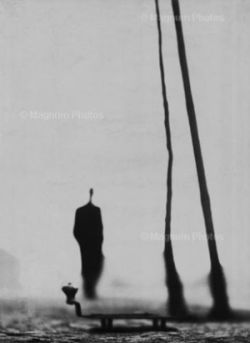 Prague, 1960
Josef Koudelka
_______________________
Historical Vertigo: Observations from the Nick of Time
Mark Slouka
agni
A dissonance worth reckoning with, if only because it is inescapable in our age. To spend a winter walking about Prague—before the great river of tourists that begins to rise in March has transformed the city into a giant bazaar, a marketplace almost medieval in its pageantry and babble of tongues—is to bear witness to an essentially ontological conflict. On the one side is being as inscribed in stone and plaster and brick, in the continual descent of sediment in whose layers our days, and the days of those who came before us, can be found. On the other is the Internet Café (whose vaulted ceiling was built two hundred years before Columbus) in which being has been, quite literally, disembodied, displaced. Dissolved into the new millennium’s version of spirit. At times, standing on some badly cobbled street in the winter dark, the smell of coal smoke in the air and someone’s cell phone digitally chiming the opening notes of the Beatles’ “Yellow Submarine,” you can almost hear the two forces crashing into each other like tectonic plates, the one going deep, disappearing, buried beneath the wedge, the other rising like air. ...(more)
_______________________
Jodi Dean on Foucault, The Birth of Biopolitics
(1): Liberalism is not a dream
(2): Crises of Liberalism
(3): State-phobia
_______________________

basement 12.16.08
ralph eaton the flickr companion site for
Jim Leftwich's textimagepoem
_______________________
The Founders’ Great Mistake
Garrett Epps
atlantic
Understandably, most Americans today are primarily concerned with whether Barack Obama can clean up Bush’s mess. But as Bush leaves the White House, it’s worth asking why he was able to behave so badly for so long without being stopped by the Constitution’s famous “checks and balances.” Some of the problems with the Bush administration, in fact, have their source not in Bush’s leadership style but in the constitutional design of the presidency. Unless these problems are fixed, it will only be a matter of time before another hot-rodder gets hold of the keys and damages the country further....(more)
_______________________
The new ecology of war
An interview with Mike Davis
eurozine
_______________________

12th Avenue — December 2008
Lee Bacchus
splinter in your eye
Lee Bacchus and Bernie Lyon
Vancouver
_______________________
Marina Pizzi
translated by Laura Modigliani
Seven Contemporary Italian Poets (3/7)
harriet
from “Under the Acorns of the Oaks”
“I have conquered the empire of an attic”
Fernando Pessoa
no longer wanting to commit
the dragging on still does not mutiny.
it is not the full grave under scrutiny
nor the idol of birth without sunset.
the dip in the path shall find paradise
under the acorns of the oaks.
*
not reaching the soil nor the air
the hangman’s chrysanthemum.
the observatory of the forehead
is unfit as a lookout
against all the bullets.
since yesterday the dunes of motherhood
rest wisely, they know the time
of buoy, the burned satchel scored
by the harangue of the prosecutor without embers.
...(more)
_______________________
On Cautiousness
Jacques De Visscher
Throughout his historico-phenomenological work, Jan Henrik van den Berg has always shown a remarkable fascination for the world of things. His attitude of care and caution in dealing with and handling things has been essential within his Metabletics or theory of change. It is only by seeing and observing, by describing and interpreting given things that we can detect the transformations of the world, the world of humans and things in their reality. As such, Van den Berg’s writings very often give a striking picture of the range of a thing. Whether he is analyzing the human lower jaw1, or looking at Jacques-Louis David’s painting, La marchière (the vegetable woman)2, in each case Van den Berg offers extremely apt evocations. Again and again he is interested in the wondrous aspects of things:
One who denies the wondrous aspect of things—that is, their changeability—
loses respect for them. Once this respect has suffered, one can handle things casually. One handles them in this way when one passes them quickly. He who moves with speed through a landscape proves that he has little respect for the things in it.
Janus Head 10.2Special Issue: J.H. van den Berg _______________________

Christian Rohlfs
1849-1938 more
_______________________
from
Cougnac, 2007
Clayton Eshleman
The mutilated man shall mount the mammoth,
shall mount and
shall enter the mammoth’s head.
The man’s head shall pierce the mammoth’s brain,
the man’s head and mutilated body
shall become the mammoth’s animating soul
and a lance shall now spit mammoth skull and soul.
This is how we get into animals,
how we project ourselves as versa
into the vice of animal stone.
This is how we lance our otherness
onto the winch of vice versa. Five poems
Clayton Eshleman
janus head
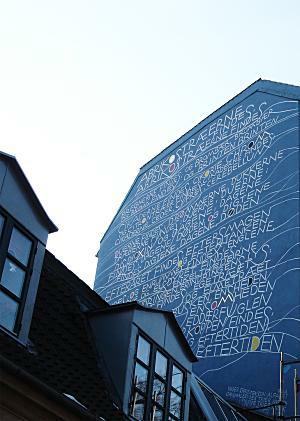 alphabet
Inger Christensen
CityPoem 70 - Copenhagen ErasmusPC Museum of CityPoems
photo by
Lia Munch
flickr
 Inger Christensen
(16 January 1935 - 2 January 2009)
photo by
Jürgen Bauer Pierre Joris has more on Inger Christensen
(and some of his own translation)
Alphabet
Inger Christensen
translated from the Danish by Susanna Nied
google books 8
whisperings exist, whisperings exist
harvest, history, and Halley's
comet exist; hosts exist, hordes
high commanders, hollows, and within the hollows
half-shadows, within the half-shadows occasional
hares, occasional hanging leaves shading the hollow where
bracken exists, and blackberries, blackberries
occasional hares hidden under the leaves
and gardens exist, horticulture, the elder tree's
pale flowers, still as a seething hymn;
the half-moon exists, half-silk, and the whole
heliocentric haze that has dreamed
these devoted brains, their luck, and human skin
human skin and houses exist, with Hades
rehousing the horse and the dog and the shadows
of glory, hope; and the river of vengeance;
hail under stoneskies exists, the hydrangeas'
white, bright-shining, blue or greenish
fogs of sleep, occasionally pink, a few
sterile patches exist, and beneath
the angled Armageddon of the arching heavens, poison,
the poison helicopter's humming harps above the henbane,
shepherd's purse, and flax, henbane, shepherd's purse
and flax; this last, hermetic writing,
written otherwise only by children; and wheat,
wheat in wheatfields exists, the head-spinning
horizontal knowledge of wheatfields, half-lives,
famine, and honey; and deepest in the heart,
otherwise as ever only deepest in the heart,
the roots of the hazel, the hazel that stands
on the hillslope of the heart, tough and hardy,
an accumulated weekday of Angelic orders;
high-speed, hyacinthic in its decay, life,
on earth as it is in heaven
Reviewed at the Complete Review
_______________________
The [Benjaminian] essay as form consists in the ability to regard historical moments, manifestations of the objective spirit, "culture," as though they were natural. Benjamin could do this as no one else. The totality of this thought is characterized by what may be called "natural history." He was drawn to the petrified, frozen or obsolete elements of civilization, to everything in it devoid of domestic vitality [...]. The French word for still-life, nature morte, could be written above the portals of his philosophical dungeons. The Hegelian concept of "second nature," as the reification of estranged human relations, and also the Marxian category of "commodity fetishism" occupy key positions in Benjamin's work. He is driven not merely to awaken congealed life in petrified objects--as in allegory--but also to scrutinize living things so that they present themselves as ancient, "ur-historical" and abruptly release their significance. Philosophy appropriates the fetishism of commodities for itself: everything must metamorphose into a thing in order to break the catastrophic spell of things. Benjamin's thought is so saturated with culture as its natural object that it swears loyalty to reification instead of flatly rejecting it [...] the glance of his philosophy is Medusan.
- Adorno, "Portrait of Walter Benjamin"
Constellation and Critique:
Adorno's Constellation, Benjamin's Dialectical Image
Steven Helmling
pmc
_______________________
The good, the bad & the naughty
Paul Gessell takes a look at Ottawa's year in art
- Best artblog of 2008 belongs to Tony Fouhse.
Fouhse produces some of the best social commentary in town with his camera. His blog contains samples of his ongoing projects alongside provocative text. This is one timely, mischievous and inspired blog. A must read for anyone interested in street people, amateur porn stars, assorted kooks and those who lovingly photograph them.
.....................................................

Waiting
Christmas Day
Helena, Arkansas
@ Tony Fouhse
Tony Fouhse Photography
Ottawa via Gary Sauer-Thompson
_______________________
The new ForeignPolicy.com
_______________________
Linh Dinh continues his seven part series, Contemporary Italian Poets
Gherardo Bortolotti
translated by Linh Dinh
_______________________

photo - mw
_______________________
Hannah Arendt and the power of the impersonal
Adam Kirsch
Arendt’s concept has become so famous that it is hard to remember how bitterly controversial it was when she first used it. Many readers resisted what looked like an attempt to trivialize the Nazis. “No banality of a man could have done so hugely evil a job so well,” one critic wrote. Yet even those who dispute Arendt’s judgment acknowledge her influence on the way we think about political evil. As long as ordinary people can be transformed overnight into mass murderers, we are still living in Hannah Arendt’s world.
It is an ambiguous tribute to Arendt, then, that her scholarly and popular profile is higher today than at any time since she died, in 1975, at the age of sixty-nine. In the past few years, a number of Arendt’s works have been published by Schocken Books, where she worked as an editor in the nineteen-forties. “The Origins of Totalitarianism” has been accompanied by several collections of essays—most notably “The Jewish Writings,” edited by Jerome Kohn and Ron Feldman, which includes Arendt’s wartime journalism. Scholars around the world have kept pace with a torrent of studies—on Arendt and international relations, Arendt and human rights, Arendt and the Jewish question. It is hard to name another thinker of the twentieth century more sought after as a guide to the dilemmas of the twenty-first.
Yet it is not just political theorists who find Arendt a source of fascination. The most intense curiosity about Arendt in the past few years has had less to do with her work than with her life. Above all, the publication in English, in 2004, of Arendt’s correspondence with Martin Heidegger, after decades of speculation about their relationship, brought renewed scrutiny to her intimate life. To a thinker who believed that the personal was emphatically not political, this kind of attention would have been very unwelcome. She derided the “pseudoscientific apparatuses of depth-psychology, psychoanalysis, graphology, etc.” as nothing more than “curiosity-seeking.” Yet Arendt’s deeply ambivalent relationship with Heidegger—her lover, teacher, and friend—has a more than personal significance, since it casts light on the most vexed issue in her work: her tangled relationship with Jewishness and Germanness. ...(more)
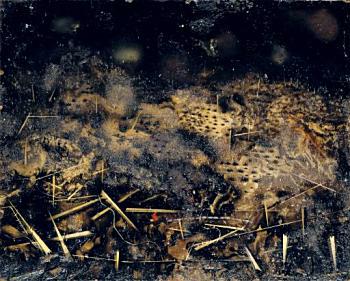
Cosmos and Disaster
c. 1936
David Alfaro Siqueiros
d. Jan. 6, 1974
_______________________
Writing is a puppy biting nothingness
Writing wounds without a trace of blood.
Under Siege
Mahmoud Darwish
(13 March 1941 - 9 August 2008)
Here on the slopes of hills, facing the dusk and the cannon of time
Close to the gardens of broken shadows,
We do what prisoners do,
And what the jobless do:
We cultivate hope.
***
A country preparing for dawn. We grow less intelligent
For we closely watch the hour of victory:
No night in our night lit up by the shelling
Our enemies are watchful and light the light for us
In the darkness of cellars.
***
Here there is no “I”.
Here Adam remembers the dust of his clay.
***
On the verge of death, he says:
I have no trace left to lose:
Free I am so close to my liberty. My future lies in my own hand.
Soon I shall penetrate my life,
I shall be born free and parentless,
And as my name I shall choose azure letters…
...(more)
courtesy of Pierre Joris
_______________________
New Russian Poetry
Editor: Peter Golub
jacket
Polina Barskova
Tr. Peter Golub
V. The Sheep Whisperer
The professor of cognitive science,
handsome and gray haired,
smokes his pipe.
He listens to the sheep,
He walks only to where
Loquacious flock
Is moving in the dark.
Among the clover, bees, and golden leaves
Blissful as Adam before the gray sin,
He hears among the sheep a certain poetry
A certain mix of sound. Complaisant? Intransigent?
I say to him: What have you heard
Besides the bahhhh and mehhhhh?
...(more)
_______________________
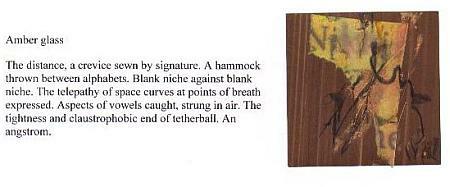
Six Chips
Nancy Burr & Nico Vassilakis
eratio
via Marco Giovenale
_______________________
Poems
Marco Giovenale
translated by Linh Dinh
Harriet
world dominion, XVII
the shifting of the earth’s axis, no? the collapse of the scaffolding on 4th of November Street, no? the landslide on Ischia, no? a pain on the ribs, no? the success of your last film, no? he was the son of an egyptian, from the first century, no? as elena walks by they turn around, no? a mouthful of air in mexico city, no? spike tried to get up, no? they checked the troubled breathing, no? the nurses were ready for the tracheotomy, no? the journalists arrive in small bunches, no? december hinders the ambulances, no? everyone frantic for presents, no? dust from the sarcophagus, no? she has already disappeared through the back door, no? the room spinned and the light went out, no? driving a taxi the wrong way against a check point he shot and was hit, no? they kidnap people arriving at the airport, no? there’s nothing to be done, no? now they go to notify the relatives, but there aren’t any, no? take a look, not even friends, no? the wife went out the service entrance, no? he only had beauty, no? not very brave but armed, no?
...(more)
_______________________
 Dante in the Dark Wood
Gustave Doré
b. Jan. 6, 1832
_______________________
Archaic Fragment
Louise Glück
poetry magazine
I was trying to love matter.
I taped a sign over the mirror:
You cannot hate matter and love form.
It was a beautiful day, though cold.
This was, for me, an extravagantly emotional gesture.
.......your poem:
tried, but could not.
I taped a sign over the first sign:
Cry, weep, thrash yourself, rend your garments—
List of things to love:
dirt, food, shells, human hair.
....... said
tasteless excess. Then I
rent the signs.
AIAIAIAI cried
the naked mirror.
_______________________
A prankish fate put George W. Bush in the oval office to keep America stupid. The nation was far from ready to see where it was going in the 21st century, and he was just the figure to keep it that way, with his void of curiosity, his allergy to reading, and his panderings to wealth-worshipping, Ponzi-loving, science-hating Jesus cultists. He goes out of office broadly regarded as an object of horror and loathing while the nation, now facing wholesale bankruptcy, struggles to imagine a plausible future, like someone who has just awakened from a cheap red wine drunk into the grip of a vicious hangover.
- James Howard Kunstler
.....................................................
He is being forgotten already, even if he’s not yet gone. You start to pity him until you remember how vast the wreckage is. It stretches from the Middle East to Wall Street to Main Street and even into the heavens, which have been a safe haven for toxins under his passive stewardship. The discrepancy between the grandeur of the failure and the stature of the man is a puzzlement. We are still trying to compute it.
-
Frank Rich
_______________________
Expiration Notice
Currently, there are several online sites, print publications and competitions that cater exclusively to young and emerging photographers- and god bless 'em! This site however, will serve as an online gallery for those who've already lived a life, continue to do so, and have the quality goods long denied the glory of the the glossy magazines or gleaming white gallery walls. We may not do much in the way of fame and fortune, but we may get you a few well deserved seconds of recognition.
If you are a serious photographer over 35 and have not got gallery representation but do have a significant body of work, get in touch!
... now taking submissions for the first edition which will go live February 2009.
via Tim Atherton
_______________________
Dispatches: Translator/Author Complexity
A.M. Correa
words without borders
Literary theorists can talk about the death of the author all they want, but when it comes to translation, this supposed spectre is a vital reality that won't be rendered obsolete so easily.
_______________________
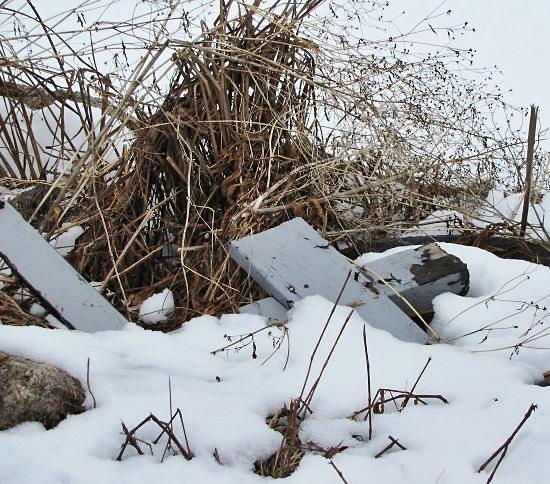
photo - mw
_______________________
The Pretender
Will Oldham transfigures American music.
Kelefa Sanneh
The idea that he is some sort of folk-art naïf, or an Ivy League dropout pretending to be some sort of folk-art naïf, long haunted and irritated him. And he spent much of the nineteen-nineties embracing and rejecting various pretenses.
The idea, all along, was to erase the person making the music so that listeners would focus on the music itself. Of course, it didn’t work that way: with each new release came a barrage of questions about Oldham’s new name, and the evasions only added to his mystique. And so, one day in 1998, flying back from a tour of Australia, he created Bonnie “Prince” Billy, inspired equally by Bonnie Prince Charlie, the eighteenth-century pretender to the English throne, and Nat King Cole. “He’s going to sing songs that have verses, choruses, and bridges,” Oldham decided. “He’s, like, a Brill Building or Nashville songwriter.” Oldham had finally found a role that he loved. A casual listener might not have noticed the difference, but it’s not clear that Oldham has any casual listeners....(more)
via Black Garterbelt

Knechte und Mägde
Dienstbotenheim
a residential care home for retired farm helper
Andreas Reeg via Mrs. Deane
_______________________
Outcast Narrative
Harold Jaffe
Jean Baudrillard wonders rhetorically: "Are there two lines to our lives, the one a non-biological, imemorial youth, which we experience in dreams, and the other an organic line of life and death, of duration and of remembrance, with which we identify our pale and mortal existence? Could there be two fundamental sequences and no relation to them? Or is the first simply the projection of the second, its hallucinatory discourse, as, deep, down psychaoanalysis argues." Baudrillard endorses the first hypothesis: "We have two existences, each of which is wholly original and independent of the other." (Cool Memories, Verso, 1990, 115). Does dream, then, represent perhaps our last frontier, a mode infiltrated by official culture but still maintaining a degree of autonomy which could be channeled into dissident, conceivably even revolutionary, agency via art? It is disputable whether dream is uncontaminated, but let's assume that it mostly is. At some juncture, then, dream-as-narrative might re-seize its dissident potential, as happened, for example, with German Expressionism and Surrealism. But that juncture is not now. People (I'm talking principally of Americans) will have to live and breathe the new world order for some time longer before they come to realize (if they ever do) that the master narrative is strangling rather than succoring them. That they're not grinning and waving but grimacing and drowning....(more)
_______________________
WE SHOULD ALL LIVE LIKE ROCKS IN A FLAT FIELD
in the caves today
the pistil of a calla lily may be speaking:
. . .THE ROOF IS FALLING
The caves are membranes breathing, huge
petals the sun breaks through
soft skin greenhouse.
Must I experience total
collapse of psychic hierarchy?
Will the caves stop being caves?
Leveling. Everything's leveling.
Alice Notley, 2 Poems from Disobedience
.....................................................
A State of Disobedience
Joel Brouwer reviews Alice Notley's In The Pines
Notley’s recognizable subjects — among them personal losses, the malfeasance of politicians, gender inequality, the failings of language — aren’t particularly new or surprising, for her or anyone else. The radical freshness of her poems stems not from what they talk about, but how they talk, in a stream-of-consciousness style that both describes and dramatizes the movement of the poet’s restless mind, leaping associatively from one idea or sound to the next without any irritable reaching after reason or plot. Each turn Notley takes seems to make its own kind of sense, though after a few sentences you’re not sure where you are, how you got there or how you might get back. Here is more from the title poem:
Whose mind are you? All of those I say. No one and my
defect tells you nothing. When your baby’s on the cooling
board. Yes I’ve see that too.
You aren’t telling me anything.
The wind blew that way because it liked to.
No one will tell me where they’ve gone ...
We know a different language, for when the mind
breaks. Or the oldest explanation of the failure to love
her.
‘I knew you were in charge of me but my mind broke
on its own.’
My mind is rubbed raw. The people who are in charge of
me are happy. ...(more)
The Poetics of Disobedience
Alice Notley It's necessary to maintain a state of disobedience against...everything. One must remain somehow, though how, open to any subject or form in principle, open to the possibility of liking, open to the possibility of using. I try to maintain no continuous restrictions in my poetics except with regard to particular works, since writing at all means making some sort of choices. But NO DOCTRINES. Rather I tend to maintain a sense that a particular form or set of rules at a certain point might serve me for a while. Like many writers I feel ambivalent about words, I know they don't work, I know they aren't it. I don't in the least feel that everything is language. I have a sense that there has been language from the beginning, that it isn't fundamentally an invention. These are contradictory positions but positions are just words. I don't believe that the best poems are just words, I think they're the same as reality; I tend to think reality is poetry, and that it isn't words. But words are one way to get at reality/poetry, what we're in all the time. I think words are among us and everywhere else, mingling, fusing with, backing off from us and everything else....(more)
Alice Notley interviewedby Brian Kim Stefans
Grave of Light: New and Selected Poems, 1970-2005
Alice Notley
Google Books
Alice Notley at EPC
_______________________

Reconstruction
Jack Levine
1962
_______________________
Neoliberalism and Bottom-Line Morality
Notes on Greenspan, Rubin, and the Party of Davos
Edward S. Herman
ZMagazine
One important manifestation of Greenspan's world view can be seen in his congressional testimony of July 22, 1997, where he explained that inflation was not increasing despite the lowering unemployment rate because of "a heightened sense of job insecurity," which he described elsewhere as reflecting the "traumatized worker," helpful in keeping wages down. He didn't suggest that job insecurity and the traumatization of workers involved any immoral "goad of fear" or had any negative implications for welfare.
Actually, in this regard Greenspan's view wasn't much different from that of a great many mainstream economists, who were slow to recognize greater job insecurity as a key factor altering the unemployment/inflation relationship, and who were not troubled when they did recognize it.(....)
... they are all a throwback to 17th and 18th century mercantilists who, according to historian Edgar S. Furniss, argued that "high wages would prove destructive of national well-being because they would reduce England's competing power by raising production costs. The prevalent doctrine held that wages should be kept at the level of the cost of physical subsistence. Hence the apparent anomaly of the laborer's position: whereas his theoretical social importance was large, his actual economic reward was miserably small.... [Under mercantilism] the dominant class will attempt to bind the burdens upon the shoulders of those groups whose political power is too slight to defend them from exploitation and will find justification for its policies in the plea of national necessity" (Furniss, Position of the Laborer in a System of Nationalism, 1920). Does this ancient view on how burdens should be distributed have some possible application to the bailouts now being put in place to deal with the current financial crisis?...(more)
The Global Class WarJeff Faux via Thivai Abhor
_______________________
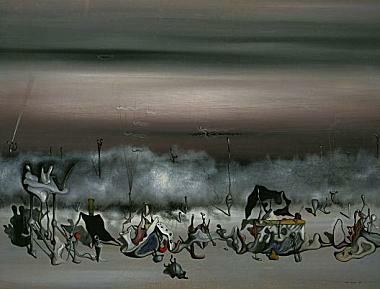
The Ribbon of Excess
Yves Tanguy
b. Jan. 5, 1900
_______________________
Vorocracy: Final: History's Most Lethal Parasites
Inspector Lohmann
Democracy, combined with the theology of Capitalism, are the modern-day carrier waves of vorocracy. In earlier times emperors and potentates enjoined their henchmen to simply extort and steal from their subjects. Now, however, given that people actually take their rights of democracy seriously, the people must be hoodwinked with ever more transparent lies — ..., "Remember the Maine!"; the Gulf of Tonkin; the Military Humanism of Kosovo; Saddam's WMDs; the War on Terror.. — to guarantee the public's support in military efforts to amass wealth.
In fact now, with the advent of neoliberal globalization, vorocrats don't need to piggy-back on the politically powerful to amass their shekels, they don't need to be the stagehands working behind the scenes. It can be argued that there is no state now; that the state is run as a corporation, the executive branch now a boardroom executive fulfilling his role for his Board of Directors. They have come front and center onto the stage and assumed their place in the spotlight to reveal America as the Mammon-state it is, run as a multi-national corporation by a cabal of conflict-of-interest, insider-trading boardroom executives who openly embezzle from the public with complete impunity. It is the Benighted States of Mammon, history's first true out-of-the-closet vorocracy....(more)
_______________________
Refuted economic doctrines #1: The efficient markets hypothesis
John Quiggin
_______________________

Guillaume Zuili
1 2
Review: Guillaume Zuili's double-exposure photographs
Fragments
photography by Guillaume Zuili
lens culture
_______________________
Top 10 Language Stories of 2008
The Web of Language
_______________________
UbuWeb Featured Resources 2008
_______________________
The Portable Boog City Reader 3 [PDF]
An Anthology of New York City Poetry
Edited by Jim Behrle, Joanna Fuhrman, Brenda Iijima, Paolo Javier, David A. Kirschenbaum, and Mark Lamoureux
thanks to Nick Piombino
_______________________
Tropical Currents - Writing by Indonesian Women
Words Without Borders
The Rooms Out Back
Nenden Lilis A.
Translated from the Indonesian by John H. McGlynn
My husband and I always rise at 7:30 when the shadow of the cat crossing the tiled roof of our neighbor's house forms a silhouette on our bedroom curtain. Who can figure out why that cat, without any training, has made it his routine to cast his shadow on our curtains every morning but because that is what the cat does every morning, its silhouette has become for the two of us a kind of alarm....(more)
_______________________
 Knechte und Mägde
Andreas Reeg
_______________________
from
every, beyond't nothing [PDF]
harry k stammer
//drop
two toes two weeks one toe three fingers
forced coat pocket cup shaking bush search back
stretched shoes toes up (8am by) arms
wrapped [out at evening in by]
knee boots black to red jacket drawn around
"¿cambio, es?" 'tending parking sitting bars lot twist'd
two toe left side shoe off reflecting
glass backed (in) car it car
"it's nothing, now, not me, no" walk
cross set end street where't: back shortly tv screen
opens "weight like" arrive implied "open'd clouds
over" //dropped popsicle sitting back bars
shoe off left knee right knee over it's such
foot on foot on calf "common reasons why people"
failed (get up) no! shoes stretching up
toes fingered can't modern walkway sleeping in't harry k stammer
_______________________

photo - mw
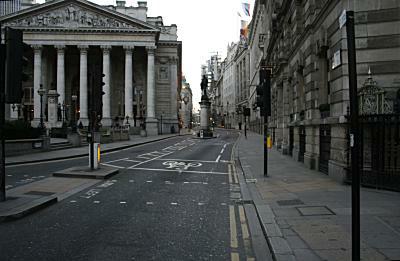
The Royal Exchange
Abandoned London
IanVisits
flickr
Xmas morning is the only time that London is (almost) empty of humans - so a morning spent cycling around town taking photos.
via William Gibson
_______________________
Under the familiar weight
Of winter, conscience and the State,
In loose formations of good cheer,
Love, language, loneliness and fear,
Towards the habits of next year,
Along the streets the people flow,
Singing or sighing as they go:
Exalte, piano, or in doubt,
All our reflections turn about
A common meditative norm,
Retrenchment, Sacrifice, Reform.
--
from W.H. Auden, "New Year Letter" (1940)
borrowed from George M. Wallace at a fool in the forest
_______________________
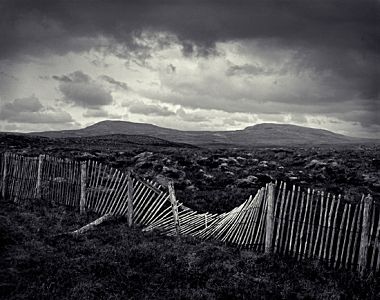
Nordic Signs
Joachim Eskildsen
_______________________
City That Does Not Sleep
Federico García Lorca
Translated by Robert Bly
In the sky there is nobody asleep. Nobody, nobody.
Nobody is asleep.
The creatures of the moon sniff and prowl about their cabins.
The living iguanas will come and bite the men who do not dream,
and the man who rushes out with his spirit broken will meet on the
street corner
the unbelievable alligator quiet beneath the tender protest of the
stars.
(....)
Life is not a dream. Careful! Careful! Careful!
We fall down the stairs in order to eat the moist earth
or we climb to the knife edge of the snow with the voices of the dead
dahlias.
But forgetfulness does not exist, dreams do not exist;
flesh exists. Kisses tie our mouths
in a thicket of new veins,
and whoever his pain pains will feel that pain forever
and whoever is afraid of death will carry it on his shoulders.
One day
the horses will live in the saloons
and the enraged ants
will throw themselves on the yellow skies that take refuge in the
eyes of cows.
(....)
Nobody is sleeping in the sky. Nobody, nobody.
Nobody is sleeping.
If someone does close his eyes,
a whip, boys, a whip!
Let there be a landscape of open eyes
and bitter wounds on fire.
No one is sleeping in this world. No one, no one.
I have said it before.
No one is sleeping.
But if someone grows too much moss on his temples during the
night,
open the stage trapdoors so he can see in the moonlight
the lying goblets, and the poison, and the skull of the theaters.
...(more)
The Selected Poems of Federico García Lorcagoogle books
Lorca at PoemHunter
_______________________
Corporate power depends upon the successful maintenance of these principles. The cultural, legal, economic, and political mechanisms used to weave the web of power are complex, interdependent, and for most of us, largely hidden behind an invisible matrix of consensus reality. But the truth of the matter is that without subsidies, limited liability, and an inordinate influence over social and political agendas and information, corporations would soon become in reality what their apologists claim they are: merely groups of people. The sooner the better.
- George Draffan, The Elite Consensus: When Corporations Wield the Constitution
Inspector Lohmann comments
I appreciate Mr. Draffan's reminder that behind corporate power is "the dynamics of the relationship between people". It is a vitally important reminder. It is, ultimately, all about people. The institutions that we accept as a given reality are nothing more than a society's (unconsciously) agreed upon fabrications that serve the vested interests of those who know how to wield them for their own ends. Here is an excellent insight from Mr. Draffan: "When society’s economic, political, and social structures become institutionalised, power tends to flow from people into institutions, but not back again. Power becomes centralised."
A thought: We serve institutions that exist only as consensual realities. The very real lives we lead are based upon shared illusions. It's all too easy to forget that the institutions we reify are ultimately nothing more than phantasms we agree are real. It's our consensus reality that, literally, personifies these institutions and vests them as entities with seeming palpable facticity, entities (rather than people) that appear to affect our environment, entities that can be experienced as distinct and powerful personalities in our midst treating us as their pawns, entities that seem to control the course of events like gods, gods with names like General Electric and Chase Manhattan and Raytheon instead of Zeus and Hera and Athena. The Law (another reification, BTW) magically conjures corporations as persons with all the constitutional protections of actual, corporeal, flesh-and-blood mortals. But there's one crucial difference, one that transmutes these legally invoked fictitious entities from personhood to deity: once articles of incorporation are granted these fictitious persons are born as immortals, thus, by definition, making them gods. But not just any kind of gods, gods of greed summoned to increase the wealth of those who invoked them, insatiable gods that happen to seek to rule the world by economically enslaving us mortals. These gods demand sacrifices: of our time, our resources, our lives lived under their yoke. Our consensual reality has created economic deities that materially oppress us.
But gods only exist if people believe in them. Gods die when people stop believing in them. And, perhaps, somehow, therein lies the key to freedom...?...(more)
_______________________
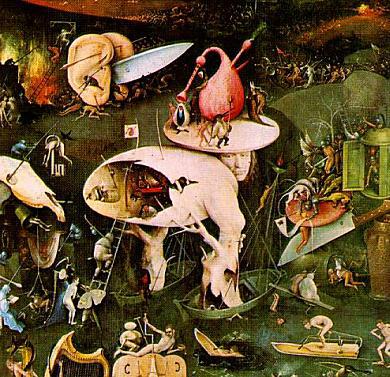
The Garden of Earthly Delights
detail
c.1500
Hieronymus Bosch
.....................................................
from
Tavern of the Scarlet Bagpipe
On Bosch’s «Garden of Earthly Delights
Clayton Eshleman
jacket
BOSCH BROKE HIMSELF, AN EGG, INTO AN ABYSS
where yolk and white weaved themselves into tapestries
roaring with world-end winds.
Each fiber an incomplete soul, a tapeworm wriggling for jointure.
Are all endings the failure to connect with source?
Thread thoughts. Fictives, one by one,
wiggle out of the Cenoté in honor of Herr Otter
bringing Cro-Magnon ore up out of the myth-obscure creature dream.
Merely to be. As a salp. Merely to be. Even as a sun ray.
“You need two beached rowboats for a real Ship of Fools,”
Hieronymus finally spoke, “one for each of my blasted trees.
I rest on what is left of Life and Knowledge.
The scene in the Tavern is shabby, true,
an old alchemical hangover, no lead into gold, rather:
melancholy into war, the Philosopher Stone endlessly
mistranslated as personal immortality...
...(more)
Eshleman at EPC
_______________________
from
Camouflage
Ange Mlinko
When dark came it came from treestands,
windbreaks so dense the night that oozes
from them’s spiked with balsalm.
In the light of this blur I saw a face
becoming hideously abstract
in former pastures where billboards
advertised right in the viewshed of
houses they were selling. Cancel the headlights.
A face buttoned-to with bees is wheezing
from nicotine, autumn, losing circulation.
Because all eyes are on history
we exist to ourselves at our own periphery
hence “I went straight home to my motel”
and wrote this song.
Ange Mlinko, Five Poems
conjunctions
_______________________

Vanitas
Still Life with the Spinario
Pieter Claesz
ca.1597-1660
_______________________
PennSound Marks Its Fourth Anniversary
_______________________
International Journal of Žižek Studies:
Vol 2, No 4 (2008)
Žižek’s New Universe of Discourse: Politics and the Discourse of the Capitalist [PDF]
Levi R. Bryant
Žižek: silence and the real desert [PDF]
Rob Weatherill
_______________________
Henry Gould has a new poem-project unfurling at Lanthanum
_______________________
My novel of the year was published 40 years ago. Golding's The Spire is elemental. It seems seems to have more in common with Greek tragedy than anything written today. Another favourite: the same author's Darkness Visible, the first part of which is a better Life and Times of Michael K., the second an exquisitely distubing account of the emergence of a sensibility and the windy winding third... almost lost me. But it's worth it for the last few fiery pages. There's no finer, stranger British writer since the war.
-
Lars Iyer
Books of the Year 2008 symposium
ReadySteadyBook
contributors are: Sacha Arnold, Derek Attridge, David Auerbach, Edward Champion, Richard Crary, Robin Durie, Scott Esposito, Gavin Everall, Rebecca Ford, Paul Griffiths, Sarah Hesketh, Lars Iyer, Gabriel Josipovici, Robert Kelly, Sophie Lewis, Charlotte Mandell, Tom McCarthy, China Miéville, Steve Mitchelmore, Nicholas Murray, Rodney Pybus, Lee Rourke, Anthony Rudolf, Leora Skokin-Smith, Dan Visel, Ken Worpole and Mark Thwaite
|
























































 Skeptics claim that the widespread public push for personal identity is the dying gasp of individuality in the flood of consumerist conformity engulfing the world. Optimists claim that their coexistence is the first stage in the emergence of an entirely new and more complex, even more subtle, form of human society, a step up in human evolution.
Skeptics claim that the widespread public push for personal identity is the dying gasp of individuality in the flood of consumerist conformity engulfing the world. Optimists claim that their coexistence is the first stage in the emergence of an entirely new and more complex, even more subtle, form of human society, a step up in human evolution. The housing estates which surround the area have seemed to almost transcend the laws of physics and bend out of the way of this tidal wave of affluence, disappearing into their own reflection. The homeless continue to heroically stake their claim to Old Street, but often almost submerge themselves into the continual crusade of half dead clubbers on a come down from a forty eight hour binge.
The housing estates which surround the area have seemed to almost transcend the laws of physics and bend out of the way of this tidal wave of affluence, disappearing into their own reflection. The homeless continue to heroically stake their claim to Old Street, but often almost submerge themselves into the continual crusade of half dead clubbers on a come down from a forty eight hour binge.